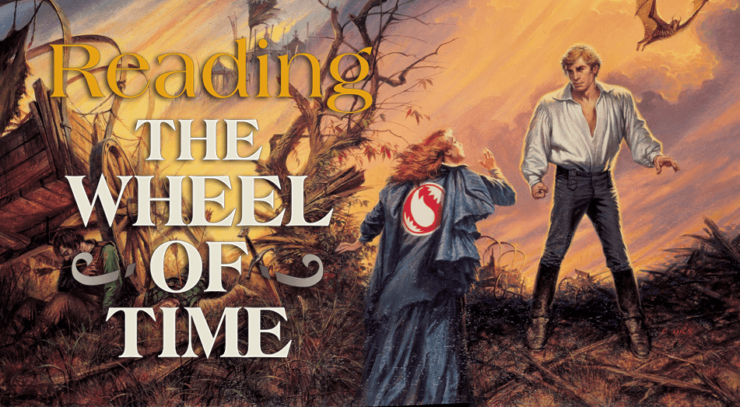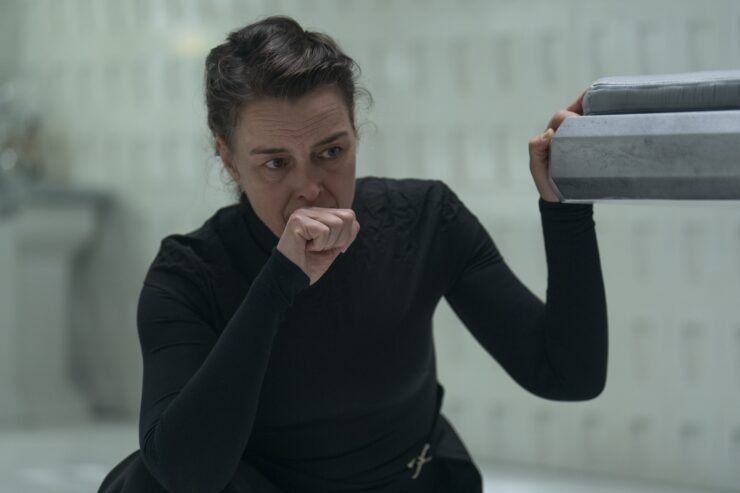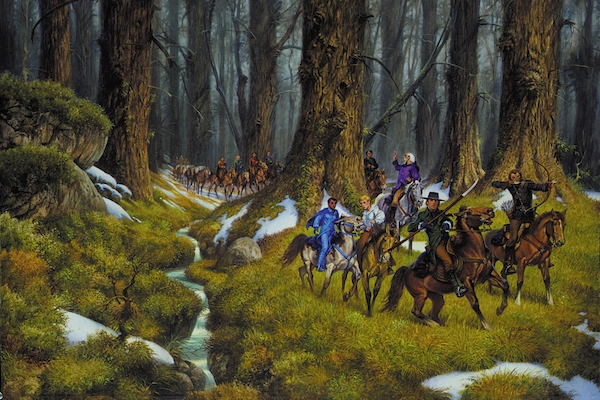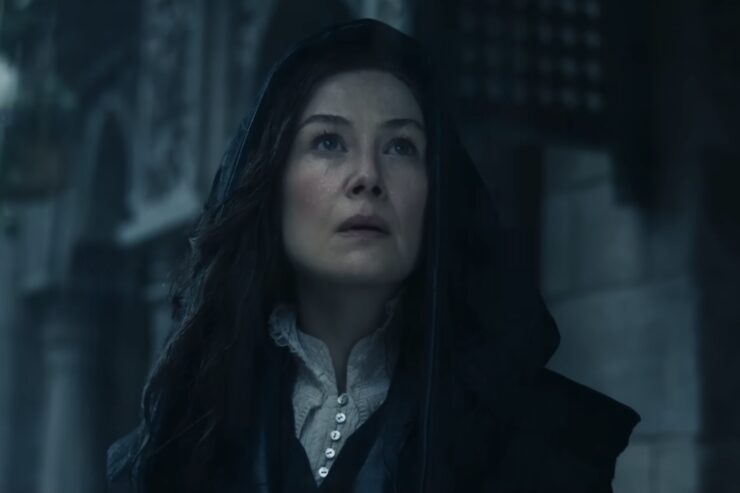Welcome back to Reading The Wheel of Time! This week we’re covering Chapter 16, in which Rand has an audience with the city clerk, some Andoran nobles, and a Forsaken meat puppet. Good times on the Dragon Throne. Good times.
Chapter 16 opens with Rand sitting on his Dragon Throne, the Dragon Scepter across his knees, listening to the chief clerk run through the business of the day.
… [Rand] was not certain anything was real to Norry except the numbers in his ledgers. He recited the number of deaths during the week and the price of turnips carted in from the countryside in the same dusty tone, arranged the daily burials of penniless friendless refugees with no more horror and no more joy than he showed hiring masons to check the repair of the city walls.
Rand isn’t really interested in listening to Norry’s recitation, too caught up in wondering why Alanna and Verin haven’t tried anything else with him yet. He’s uncomfortable with the sense of Alanna in his head as well as with the hard seat beneath him, but he is at least getting the hang of Taim’s trick to ignore the heat, and he isn’t sweating.
Bashere interrupts then, bringing in the four Andoran nobles Rand has been waiting for, Lady Dyelin, Lady Ellorien, Lord Abelle, and Lord Luan. Bashere introduces Rand, “Lord of the Morning, Prince of the Dawn, True Defender of the Light, before whom the world kneels in awe.”
Rand notes the little addition Bashere has made to the list of titles the two decided upon together, and reflects upon Moiraine’s advice about how what people see of him first will always be what stays most in their minds. He greets the four gallantly and invites them to sit with him on some chairs and partake of chilled wine, served by the gai’shain. Rand notes the Andoran’s hostility towards Bashere as well as towards the Aiel—and the gai’shain’s affront at being commanded to serve wetlanders.
Buy the Book


The Eye of the World: Book One of The Wheel of Time
They discuss Rand’s desire to find Elayne and make her queen, which Dyelin approves of but Ellorien disagrees with, saying that Morgase betrayed and spurned her friends and allies. She wants Dyelin to be the next Queen of Andor. Abelle is still worried that Rand killed Morgase, and Dyelin speaks of the rumors surrounding who Rand is and what he is there to do, some of which are worse than rumors Rand has already heard about himself. Some even say he killed Elayne as well as Morgase. He asks if they will help him make Andor whole again, and is frustrated when they remind him that he is supposed to fight Tarmon Gai’don, not become a ruler. He assures them he intends to see Elayne crowned, then to leave and never return.
Dyelin tells him that she will wait and consider, and that if he does as he says she will send her forces to fight at his side when the time comes. And that if he doesn’t, she will send her forces against him. The others all promise to do the same, and Rand considers to himself that honest opposition is even harder than Tairen sneaking around behind his back.
As they leave, Rand takes Dyelin aside and asks after the strange looks she’s been giving him. She asks after his parentage, and then explains that he bears a strong resemblance to Tigraine, a previous Daughter-Heir of Andor who vanished one night, never to be seen again, leaving behind her husband and son, Galad.
Rand felt a shock of his own. He felt cold. Fragments of the tale the Wise Ones had told him spun through his head… a golden-haired young wetlander, in silks… son she loved; a husband she did not… Shaiel was the name she took. She never gave another… You have something of her in your features.
He learns that some believe Gitara Moroso was at fault for the disappearance of Tigraine, and that her disappearance set in motion a chain of events that resulted in Cairhienin schemes and Laman’s Pride. She wonders what would have been different if Tigraine had become Queen, with Morgase remaining only the High Seat of House Trakand and Elayne never born at all, and leaves Rand musing over the way so many events seem to have folded in on each other.
So many lives changed, lives ended, so she could give birth to him at the proper time and place and die doing it. Kari al’Thor was the mother he remembered, if dimly, yet he wished he could have known Tigraine or Shaiel or whatever she wanted to call herself, even if only for a little while. Just to have seen her.
Bashere comes back, startling Rand out of his reverie, saying that someone else has come to see him. Rand isn’t interested, but Bashere insists—the man claims to be a messenger of Lord Brend. The Illianer, gray-haired and well-dressed, is escorted in.
He had a stub of a nose and a wide, grinning mouth. As he came closer, though, Rand realized that grin never altered by a hair. The man’s whole face seemed frozen in that one mirthful expression. By contrast, his dark eyes stared out of that mask, swimming with fear.
The Aiel observe that something has been done to the man, who announces that he brings a message from Lord Sammael. When he speaks the message, it is in a different voice entirely, one Rand recognizes from Lews Therin’s memories. Sammael suggests that, while they will eventually stand on opposite sides, they declare a temporary truce. He offers to not to move against Rand or to expand his borders past a certain area, leaving the larger share to Rand, and not to aid any of the other Forsaken in their attempts to fight him.
“You have done well so far in removing the Chosen from the field. I have no doubt you will continue to do well, better than before, knowing your southern flank is safe and the others fight without my aid. I suspect that on the Day of Return, there will be only you and I, as it should be. As it was meant to be.” The man’s teeth clicked shut, hidden behind that frozen grin. His eyes looked near madness.
Rand knows that even if he could trust Sammael, such a truce would mean abandoning “countless thousands to Sammael’s mercy, a quality the man had never had.” He realizes he has seized saidin, his rage sliding across the surface of the Void as he tells the messenger that he will lay every evil he has ever done at his feet, naming places and acts from Lews Therin’s memories as he promises to make Sammael pay for every one.
“Tell him, no truce with the Forsaken. No truce with the Shadow.”
The messenger begins to sweat blood, then collapses, thrashing in an ever-widening pool of blood. Rand knows that there’s nothing he can do to help, so he just watches, as do Bashere and the Aiel. Aviendha observes that it’s a strange end to a strange man, and Rand realizes that she arrived in the Hall without his noticing. He notes the way she looks him over, checking to see if he’s hurt, and reminds himself that she’s only there to spy on him for the Wise Ones.
She tells him that she needs to go to Cairhien with him to speak to the Wise Ones, and Rand answers graciously, privately wondering if he could manage to leave her there. Bashere reminds Rand that he is supposed to watch Bashere’s horsemen go through their paces, but although Rand knows this is important, he says it must wait a day or two. He needs to get away from the Queens of Andor whose painted images seem to be watching him disapprovingly, and from the feeling of Alanna and the awareness of her presence. If only for one night.
I guess in this instance it’s a good thing that Rand has that maxim against killing women or putting them in harm’s way. He doesn’t know what Alanna did to him or the harm her death would cause. I wonder if the severing of the Warder/Aes Sedai bond is more or less severe depending on how close the bondees in question are, and how long they’ve been bonded together. Obviously part of the trauma of losing your bonded partner is being able to feel their death, but if you’ve been bonded to someone for a long time their presence in your mind is going to come to feel like a part of you, and thus losing it will feel not just like losing someone you were very close to but actually like losing a part of yourself. It’s hard to say exactly how much Alanna’s death might affect Rand if he were to order the Maidens to assassinate her. But even if having her out of his mind is still a relief, I’m sure the consequences would be severe for him. I know he wasn’t exactly in the mood to talk, but I really feel like Alanna and Verin should have at least tried to give him a quick low-down on bonding. Then again, the whole thing was so unplanned, and I don’t think Rand realizes that. He’s probably assuming that Verin and Alanna plotted the whole thing out, and so of course he would expect that they’d have tried to make another move by now. Instead, Verin had no idea it was going to happen at all, and even Alanna has no plan other than thinking that it would be good to put a string on Rand, as well as Perrin and Mat if they can manage it.
I noted that, when Rand found himself staring at the wall in Alanna’s direction, he firmly told himself that he would not replace Moiraine with a woman who would ambush him like that. Of course we know that Elayne, Nynaeve, and Egwene are the only Aes Sedai Rand will ever really trust, and even those warily. But we actually didn’t get to see much of how his relationship with Moiraine progressed once they worked out their truce. Since her death we’ve had several moments like this one, in which Rand has considered how much he trusted her and relied on her.
I love the contrast of Rand listening to Halwin Norry’s report and Niall listening to Balwer’s report back in Chapter 9. Then, Niall reflected upon the fact that Balwer would serve any master as well as he serves Niall, and that this makes him a better spy—he has no particular agenda towards how the information should be used. But Balwer’s sort of neutrality isn’t exactly neutral—he may not care how the information is used, but it can be used in a variety of problematic ways, and he is choosing to serve under someone with a very specific agenda. Norry, on the other hand, with his focus entirely on his clerkly duties, is actually doing something pretty remarkable, not to mention helpful. As Rand notes in this section, so many people have abandoned their own lives now that the Dragon Reborn has arrived in the world. Some have forsaken old bonds and come to follow him. Others flee the cities he conquers, as many in Andor have. But Norry’s job as chief clerk must be done no matter who rules Andor or is running Caemlyn, so his detachment is ultimately useful and good—at least as long as he keeps doing the job properly. If he let his duties be changed so that important aspects of caring for the people became overlooked, that would be different, of course.
In any case, the narrative is continuing to set up this thematic comparison between Rand and Niall, as they both strive for control over Caemlyn and Andor. The business with the titles and Rand following Moiraine’s advice as he tries to make the right impression on people was interesting, and a very astute observation on Moiraine’s part. Not that I expect anything less from her, but where a lot of the psychology behind Rand’s actions centers around complex political maneuverings and the Game of Houses, this is a straightforward observation about how much first impressions matter to people. And it’s also a reminder of how Rand cannot allow himself to be seen as he wants to be. During his encounter with the Aes Sedai initiates from Emond’s Field, we were reminded of how much it pains him to have lost his identity as Rand al’Thor, shepherd from the Two Rivers. He is trying to cultivate an image of the Dragon as strong and benevolent in the face of fear and rumors that would make him a monster, but those are his only two choices, really. He is the Dragon Reborn, and he cannot afford to be seen as a simple shepherd.
Like Rand, I found it amusing when he faced the open hostility of Dyelin, Ellorien, Abelle, and Luan, and found that it might be even more difficult to deal with than the sucking up or sneaking around that he’s been dealing with from the Tairen and Cairhienin nobility. But also I really like them, and I like how we can see that it’s not just the Two Rivers that is home to a stubborn and strong people. It’s all of Andor.
It does make me worry for Morgase, though. Abelle, Luan, and Ellorien are all people who supported Morgase’s first claim to the throne, and in Chapter 9 the narrative mentions that she’d be upset if she heard those names among the list of those who “knelt to al’Thor.” If these four decided to trust Rand and back his attempts to locate Elayne and see her crowned, Morgase might hear about it—and she might hear only that they are friendly with him and supporting him. Of course, only Dyelin actually supports even that idea right now; the others all seem to hold grudges against Morgase for her apparent betrayal. Unfortunately it doesn’t seem to have occurred to anyone that she might have been under Rahvin’s influence. Rand doesn’t know about Compulsion, but surely anyone who accepts that lord Gaebril was really one of the Forsaken would at least consider that Morgase, who was always considered a good and just ruler and who seemed suddenly to change drastically in personality, might have been influenced and manipulated by him in some way.
Of course, in order to come to such a consideration, the Andoran nobility would have to accept Rand’s claim about Lord Gaebril, which they clearly haven’t, since many still suspect that Rand is the one who killed her. But if I were Rand, I think I would want to push that angle more. You would think he would want to remind them of why he came to Caemlyn—he’s reminded them that he doesn’t want to rule, but he’s neglecting to remind them of why he was forced to take over in the first place. Abelle reminds him that the Karaethon Cycle says that Rand is supposed to fight the Dark One but not that he’s supposed to rule. Putting aside the fact that those prophecies might be open to a little more interpretation than Abelle is accepting in this moment, Rand’s coming to Caemlyn was all about fighting the Dark One, and not about ruling.
But then, I guess that brings us to the real point, which is that Rand is saying he doesn’t want to rule Andor, and yet he is deciding who will. Dyelin might be willing to tolerate his presence for now because she also wants Elayne on the Lion Throne, but Rand is telling these people who their ruler will be. His motives might be good—Elayne is the rightful heir, both legally and morally speaking, as long as you accept that Rahvin is responsible for what happened to Morgase, and he knows that he needs Andor to be strong and united in time for the Last Battle—but he is still basically a foreign authority coming in and telling them who their ruler will be, and that he will only let go of the power he has seized in Andor when the Lion Throne is filled according to his design.
This is another one of those moments when I have a lot more sympathy with those who are struggling to accept and trust Rand. Don’t really feel that for the High Lords of Tear. But hopefully these four will come to trust Rand’s intention with Elayne, at least. I wonder how long it will take to get all that sorted. Will Elayne have a chance to finish her training as Aes Sedai before she’s installed as Queen of Andor? And how will she balance needing to put her country first when she also has duties towards Rand and towards the Last Battle? She’s the only Aes Sedai who can make ter’angreal and she understands them better than anyone. She’s also one of the most powerful modern channelers. They’re going to need her for more than just ruling.
I’m so glad Rand finally knows the truth about his mother! The narrative has already given the reader all the information we needed to piece it together, although I kept forgetting about it because there is so much space between the various moments when characters have mentioned Tigraine and her disappearance. Similarly, I keep forgetting that Elaida’s Foretelling about the importance of the ruling family of Andor to the Last Battle might actually have been indicating Tigraine’s importance as Rand’s mother, not Morgase’s importance. By the time Elaida arrived in Andor, Tigraine was already gone and Morgase was Queen. She doesn’t seem to have considered that it might have been the Queen who was in power at the moment she had her Foretelling, not the one who is in power at the approach of Tarmon Gai’don, whose significance she was meant to see. (Although it is still possible that it is Elayne’s importance that Elaida’s Foretelling was about—she is powerful in her own right as well as intimately connected to Rand and will no doubt be instrumental in his success in the Last Battle.)
Rand’s realization of the circular nature of the circumstances of his conception and birth is really one of the best examples so far of the workings of the Pattern. One wonders, not for the first time, what part free will has to play in these events—was it theoretically possible for Gitara to choose not to convey her message to Tigraine, or for Tigraine to disbelieve her, or to fail to find the strength to make such a difficult personal sacrifice? Was the Pattern acting through Gitara, directing what was meant to happen, or was Gitara influencing the Pattern through her ability in Foretelling and her authority as an Aes Sedai?
I don’t know the answer to any of these questions, and I’m sure there are Aes Sedai philosophers who have dedicated a lot of time to pondering the subject. It’s interesting to do so alongside them.
So Sammael’s messenger was incredibly creepy. The description of his smile and the terror in his eyes, as well as the “stub of nose” and wide mouth reminded me of some of the visions Rand, Perrin and Mat were given by Ba’alzamon in the first two books, as well as the description of Aginor’s worn-down face when we met him in The Eye of the World. It also reminded me of Padan Mordeth-Fain, especially before he had fully settled into his Ordeith persona. All this evokes the sense of decay and using living bodies as puppets that I’ve come to expect from anything involving the Dark One, or any other capital “E” Evil in this world. It’s highly effective here, and once again Jordan impresses with his incredibly vivid and detailed descriptions.
Part of me thinks that Sammael’s offer really was genuine. I’m sure he’d go back on the promise any moment that it suited him, of course, but I can see how might genuinely believe that this compromise favors both parties. He has a very inflated sense of his own importance to Lews Therin, and seems to truly believe that he was meant to be the man’s main rival, so I can see him desiring to be the only Forsaken left and to go one-on-one with Rand when the time comes. On the other hand, his comment about leaving “the greater share” of land to Rand definitely feels like a smokescreen—he wants to have a powerful army to offer the Dark One when the time comes, and that wouldn’t be very impressive if Rand’s own army dwarfed Sammael’s. And although his ego is ridiculous, one would think that Graendal’s warning about how the Forsaken are all being picked off and that they need to stand together would still be drifting about in his mind, at least a little bit? He can’t be so overconfident to think that his victory over Rand would come easily after all the other Forsaken have been destroyed.
Well, no, he probably could be. And he might be the least likely of Rand’s enemies to come at him secretly, since wanting to face Lews Therin was such a big thing with him. It’s so hard to tell with the Forsaken when their superior knowledge and experience will win out, and where their hubris and greed will trip them up.
Next week Rand travels to Cairhien, where we will find that he has left Berelain in charge. I haven’t actually finished the chapter yet so I’m not sure what else is going to happen, or whether we’ll only cover 17 or if we’ll get to 18 as well. But I’m looking forward to see if the character of Berelain gets more interesting now that she’s got more to do than try to sleep with Rand and/or Perrin. In the meantime, I leave you with my favorite line of Chapter 16:
“I think,” Bashere said slowly, “maybe Sammael will have his answer when this fellow does not return. I have heard of killing a messenger who brought bad news, but never killing him to tell you the news was bad.”
I love Bashere so much, his dry humor really is a gift. I suppose Rand doesn’t have the perspective to appreciate it, but I can see the Aiel getting along with him pretty well.
Sylas K Barrett has a lot of sympathy for all the characters suffering through the ongoing, Dark One induced heat wave. But he is also very thankful that spring is on the way in his neck of the woods.













